Who doesn’t want the kid to be responsible, independent, and confident?
One of the simplest yet most effective ways to teach these qualities is by involving kids in household chores.
But the big question many parents ask is: Which chores are right for my child’s age (age-appropriate chores)?
The good news is that children can start helping at a very young age, if the chores are age-appropriate. Assigning the right tasks not only keeps them engaged but also builds life skills they will use forever.
In this guide, we’ll walk you through age-appropriate chores for kids, their benefits, and how to make the process fun and stress-free.
Age-Appropriate Chores for Kids
Age 2-3 Years (Toddlers): The First Steps
At this stage, kids are curious and eager to copy adults. Simple, fun chores work best. Include them in simple things, need fewer instructions and which they don’t need little skill. Show them how it is done for the first few times, and they will follow you.
– Pick up and put toys in a box
– Put your books on the shelf
– Wipe small spills with a cloth
– Put dirty clothes in a basket
– Help feed pets (with supervision) if any
– Carry light items (like napkins) to the table
– Dust with a duster
– Water plants
– Throw small items (if any) in the trash
👉 Tip: Keep it short and playful. Sing a clean-up song or do it together.
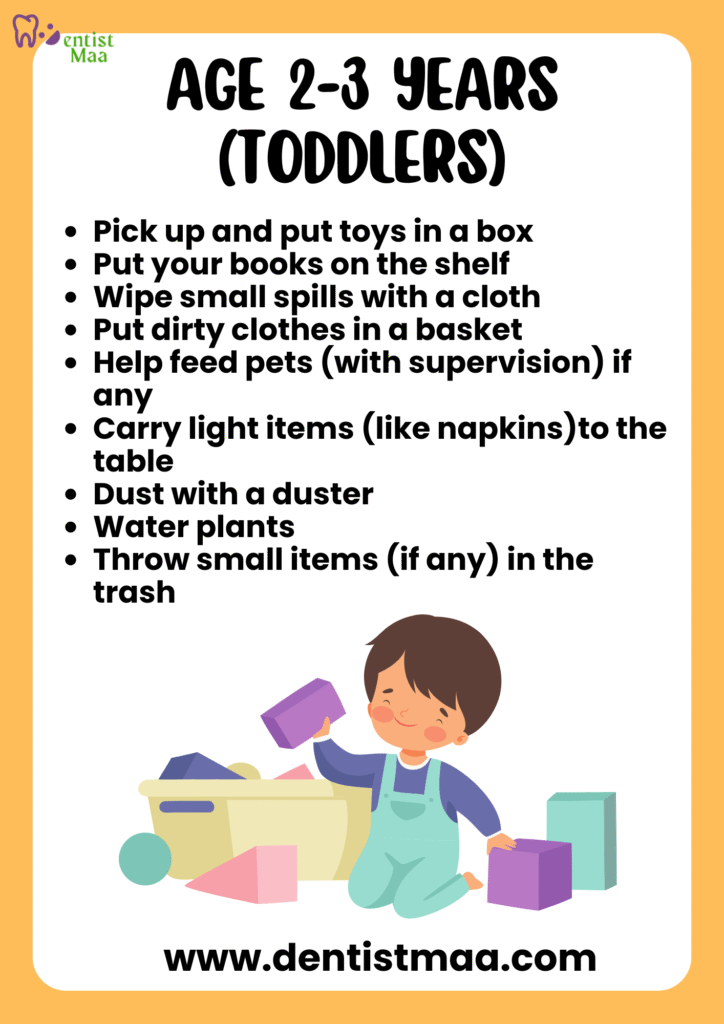
Ages 4–5: Little Helpers
Preschoolers love feeling “grown-up.” Give them tasks that make them feel important. I started calling my daughter a little helper at this age, and she still loves calling herself my little helper.
– Set the table for meals
– Water plants (Can be done at all ages)
– Match socks from the laundry
– Put away groceries (light items) (My little one always loved keeping the vegetables in the fridge)
– Help make their bed
– Clear their plate after eating
👉 Tip: Praise effort, not perfection. The goal is habit-building.
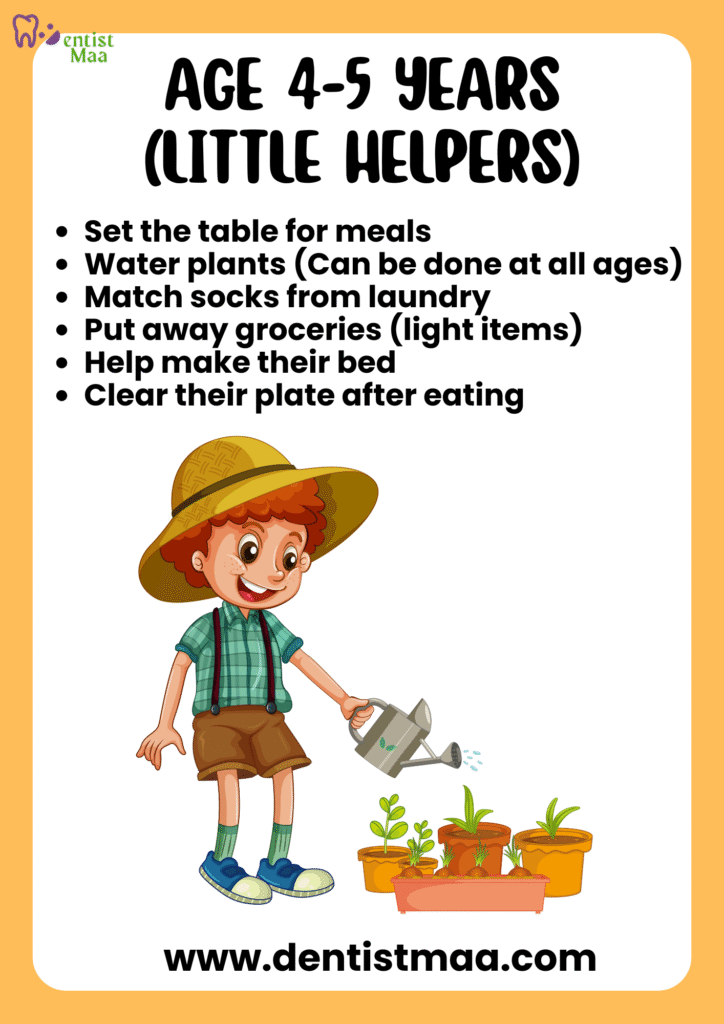
Ages 6–7: Building Responsibility
Now, kids are more coordinated and can handle slightly complex tasks. So, we can add things which need a little more detail and effort at this age. Don’t worry, they will be able to do it.
– Fold small laundry items (towels, napkins)
– Sweep small areas with a broom
– Pack their school bag
– Dust furniture (areas accessible)
– Help prepare simple snacks (sandwich, salad)
– Empty small trash bins
– Empty the dishwasher
– Organise study table
👉 Tip: Use a simple chore chart with stickers for motivation.
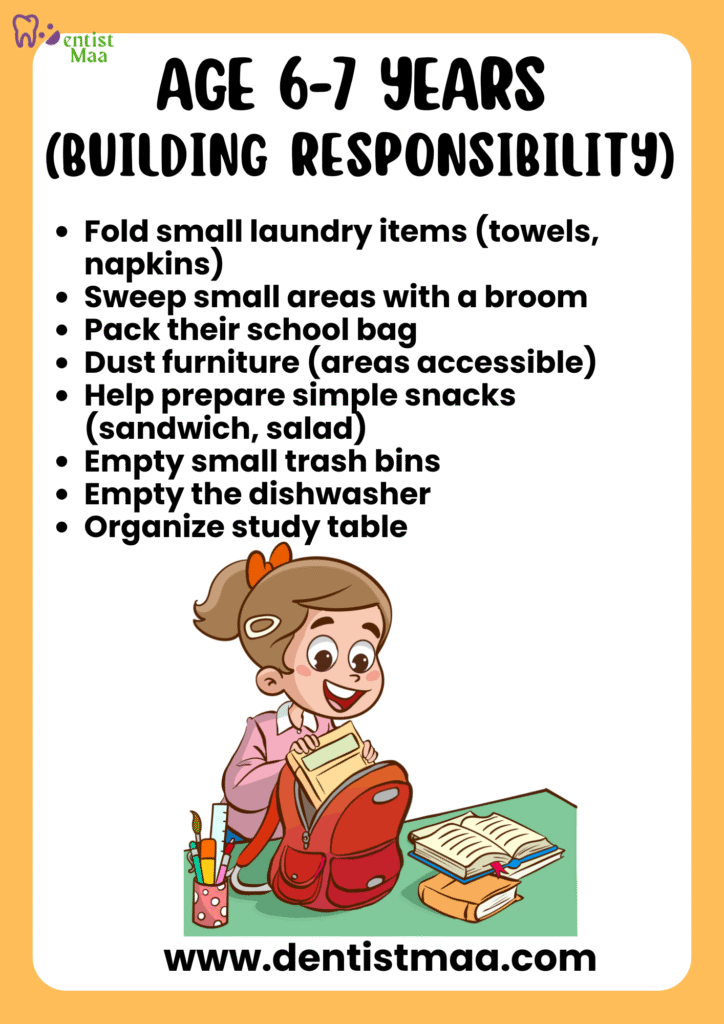
Ages 8–10: Independent Doers
Children at this stage want more independence, perfect for giving bigger responsibilities.
– Fold and put away laundry
– Mop (or vacuum) small rooms
– Wash dishes or load dishwasher
– Help cook with supervision
– Take care of pets (feeding, brushing)
– Take out the trash
– Keep their room clean
– Load dishwasher or help wash utensils
👉 Tip: Rotate chores weekly so kids learn different skills.
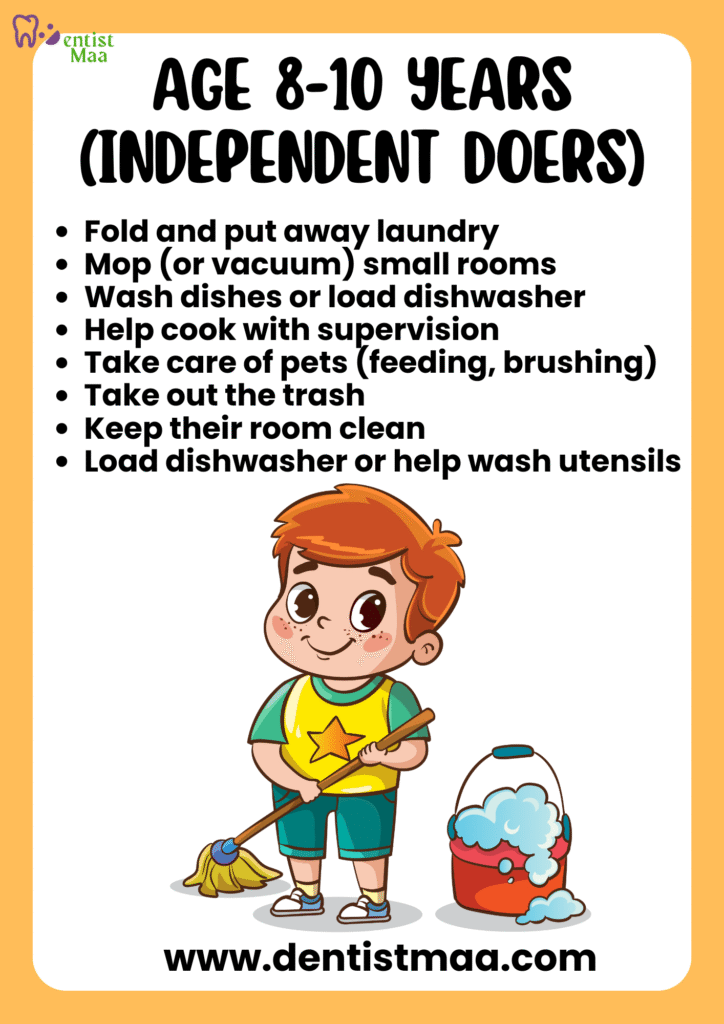
Ages 11–13: Pre-Teens Taking Charge
Pre-teens can manage most household chores with little supervision.
– Do laundry from start to finish
– Cook simple meals
– Clean the washrooms
– Mop floors or vacuum
– Babysit younger siblings (short periods)
– Mow the lawn or water the garden
– Organise shelves or cupboards
– Wash utensils or load and unload the dishwasher
👉 Tip: Teach them how to do chores correctly before expecting them to do it independently.
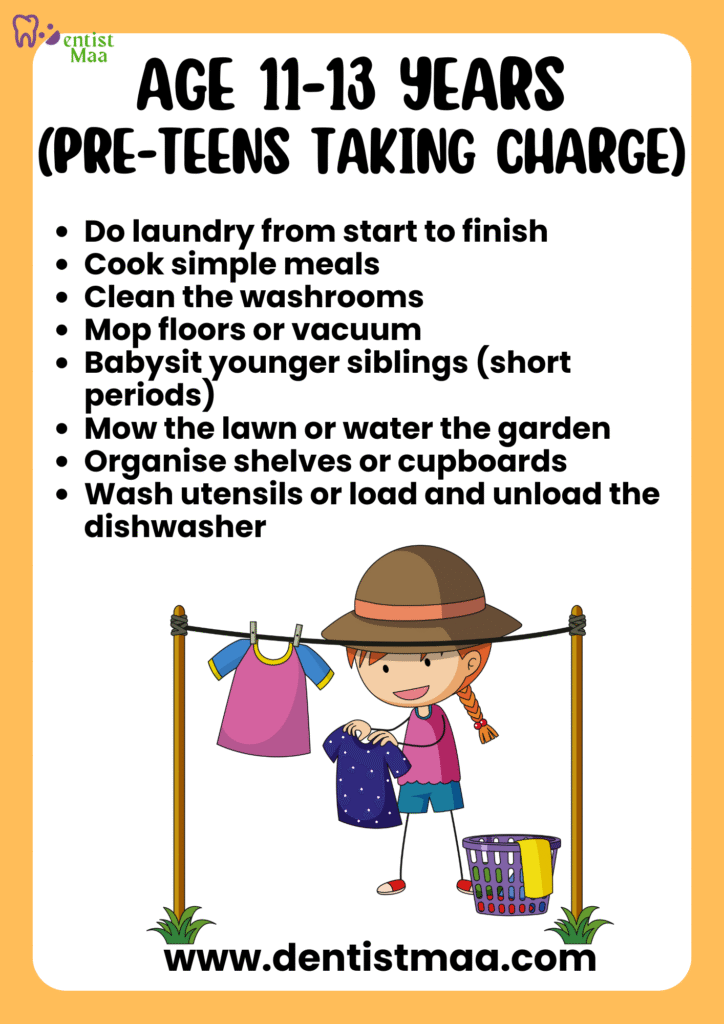
Ages 14 and Above: Teenagers Preparing for Adulthood
Teenagers should be able to handle almost all household responsibilities, preparing them for life outside the home.
– Cook meals independently
– Grocery shopping
– Deep cleaning bathrooms and the kitchen
– Iron clothes
– Manage personal finances (budgeting allowance)
– Help with household repairs
– Take on family responsibilities when parents are away
👉 Tip: Involve teens in decision-making—like meal planning or shopping lists—to give them ownership.
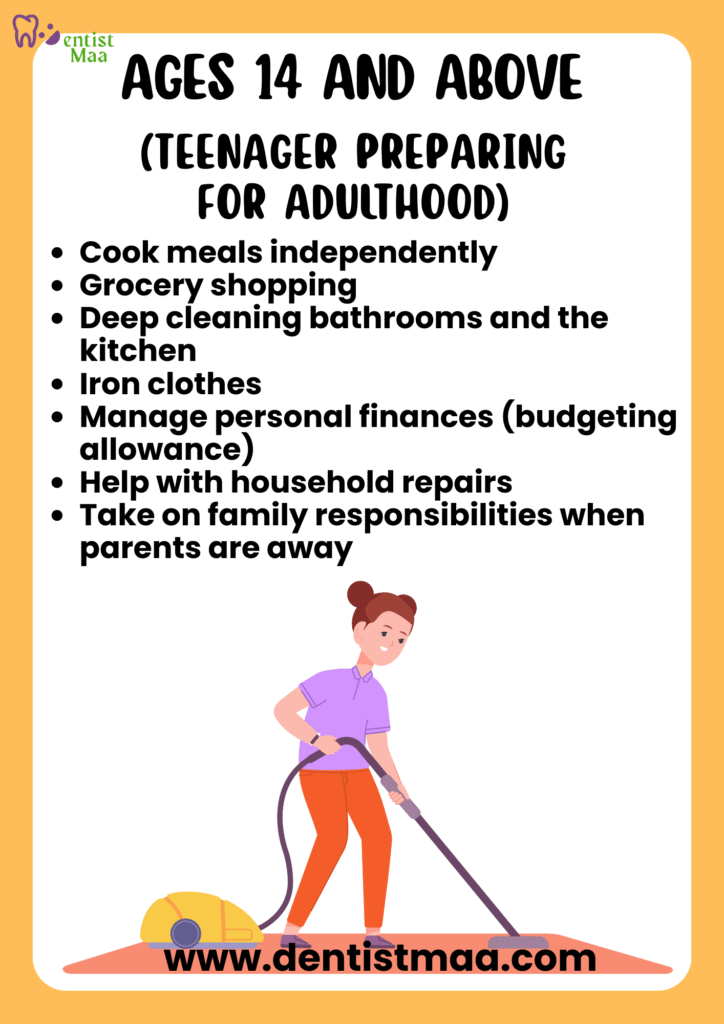
How to Make Chores Fun and Engaging
To make the child enjoy the age- age-appropriate chores, help them make it fun and engaging. Make memories while doing the chores. Here are a few ideas on how you can encourage your child to do chores.
– Play music while cleaning- This helps in elevating the mood and helps with doing work easily and quickly.
– Use rewards like extra playtime instead of money every time- Ideally, a reward for chores is not a good idea. However, occasionally, you can offer incentives like extra playtime or ice cream to the child as a motivator.
– Create a colourful chore chart for motivation– This helps the child to stay active and motivated. It will create a zeal in the child to finish all the chores just to complete the chart.
– Do chores together as family time- This creates bonding and a stronger bond between the parents and the children. Upon that, the child learns from you and later includes it in his or her life.
– Celebrate progress, even small ones– They can not be perfect all the time, as they are children and are still learning. So, appreciate the effort and not the result.
FAQs on Age-Appropriate Chores
1. Should chores be different for boys and girls?
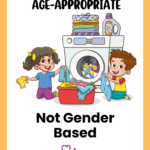
No, chores should be taught on the basis of age and not gender. Both boys and girls should be independent and should know how to take care of themselves. Gone are the days when males used to go out and earn money, and females used to stay at home and do household chores. Both should be taught and raised to do both. So, start with age-appropriate chores for your child, whether it is a boy or a girl.
2. What if my child refuses to do chores?
Stay consistent. Make chores part of a daily routine, offer choices, and model the behaviour yourself. Slowly, the child will be involved in the chores. Choose only age-appropriate chores for the child, as it will keep the child involved and interested in them.
3. Should I pay my kids for doing chores?
Chores are more about learning responsibility than about getting work done. It is not a job, but something you need in life later. So, no, you should not pay your kids for doing chores. Occasionally, you can get some bigger jobs done, like cleaning the car and give incentives like pocket money to teach children financial lessons.
Take Away Message
Giving age-appropriate chores not just helps the child in learning responsibility and teamwork, but it also helps reduce your workload and keep the child busy. So, it is benefiting both. Initially, it might be a little difficult as the children are still learning. But with time, the child will start doing it on his/her own.
So, start giving your child age-appropriate chores today if you have not started it, and see the difference.




